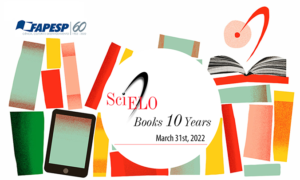By Abel Packer and Amanda Ramalho
SciELO Books celebrates ten years of operation focused on the development of infrastructure and capabilities for publishing academic books in digital format according to the state of the art.
As part of the ten years celebratory event, which is proposed as a forum for the recognition of advances and challenges and, mainly, for the debate on the future of the digital book in the light of open access and open science, we are publishing interviews with speakers at the meeting and authorities of institutions directly linked to the development of SciELO.
We started the series of interviews with the Publishers’ Directors of Fundação Oswaldo Cruz (Fiocruz), Universidade Federal da Bahia (UFBA) and Fundação Editora Unesp. Together, the Directors of the founding publishers João Canossa (Executive Editor of Fiocruz Publisher), Flávia Goulart Mota Garcia Rosa (Director of EDUFBA) and Jézio Hernani Bomfim Gutierre (Director-President of Fundação Editora Unesp) answered our questions.
1. [SciELO Books] The decision of the founding publishers to establish the SciELO platform provided Brazil and, progressively, Latin America with infrastructure for publishing academic books in digital format (eBooks) according to the state of the art. What were the expectations that motivated them to commit to the project? Did they take place over these ten years?
[JOÃO CANOSSA, FLÁVIA ROSA, JÉZIO GUTIERRE] For the founding publishers, the first point to substantiate the interest in participating in the Program stemmed from the prestige and success model of SciELO journals and all the credibility that had already been garnered by the work previously developed. Other than that, there is the intention to strengthen the segment of university publishers, since, in general, these publishers, at that time, did not have the technological resources or the desired expertise of SciELO for the digital dissemination of their titles. In fact, there were not and, in most academic publishers, there still isn’t trained personnel or infrastructure to support work such as what SciELO intended to offer. Expectations, therefore, were justified and are still sustained today: the SciELO Books program largely responded to the objective of properly, widely, and quickly disseminating digital content from university presses. This is a goal that remains paramount and that sustains the relevance of the project even nowadays.
2. [SciELO Books] From the founding publishers’ point of view, what’s the biggest challenge for the future of the digital book and the future of SciELO Books in terms of achieving the goals of access, use, visibility, and interoperability?
[JC, FR, JG] For the future of SciELO Books, we believe that the biggest challenge is related to the sustainability of the project: how to maintain the existing infrastructure and constantly update it due to the speed of technologies obsolescence. In the times of scarcity of resources for education, science, and technology, we are experiencing, it is difficult to stimulate the implementation of policies within each institution, to encourage and finance the maintenance of the project with the insertion of new titles and adhesion of new publishers.
3. [SciELO Books] Over these ten years the number of open access books has been increasing. Does SciELO Books contribute to this increase? What are the future prospects for open access to predominate in the publishing of academic books?
[JC, FR, JG] SciELO contributes both quantitatively and qualitatively, but the project should reach an even wider audience and dialogue with this audience that actually finances it. The conditions for open access to prevail among academic books go through complex variables that certainly transcend the scope of a project such as SciELO Books. Broad public and institutional financing policies are essential for free access to reach the desired levels and dissemination. However, it is certain that programs such as SciELO are valuable instruments for this type of access to flourish and reach its target audience.
4. [SciELO Books] As founding publishers, what are the expectations for the next ten years of SciELO Books?
[JC, FR, JG] We believe in the platform’s potential, and we have expectations regarding two main points that will enhance the reach and results of SciELO Books. The first refers to the wider dissemination of the program: its dissemination is still very timid, and this keeps its results from being recognized and its collection from expanding. The second point is related to the expansion of indexing which, by its very dynamics, strengthens and values the publishing of books – something strongly attested in the case of journals. For the academic rewards-and-evaluation system to value the book as it values the journal, it is necessary to support metric studies of book publishing and assimilation, and SciELO plays a very important role in the Brazilian scenario and is a prominent initiative in this regard.
The event celebrating SciELO Books’ ten years anniversary will happen on March 31th, 2022, starting at 9:00 AM (BRT). Register for the event and check the program in: https://books10.scielo.org/en/
External links
SciELO Books 10 Years: https://books10.scielo.org/en/
SciELO Books: https://books.scielo.org/en/
Translated from the original in Portuguese by Lilian Nassi-Calò.
Como citar este post [ISO 690/2010]:

















Recent Comments